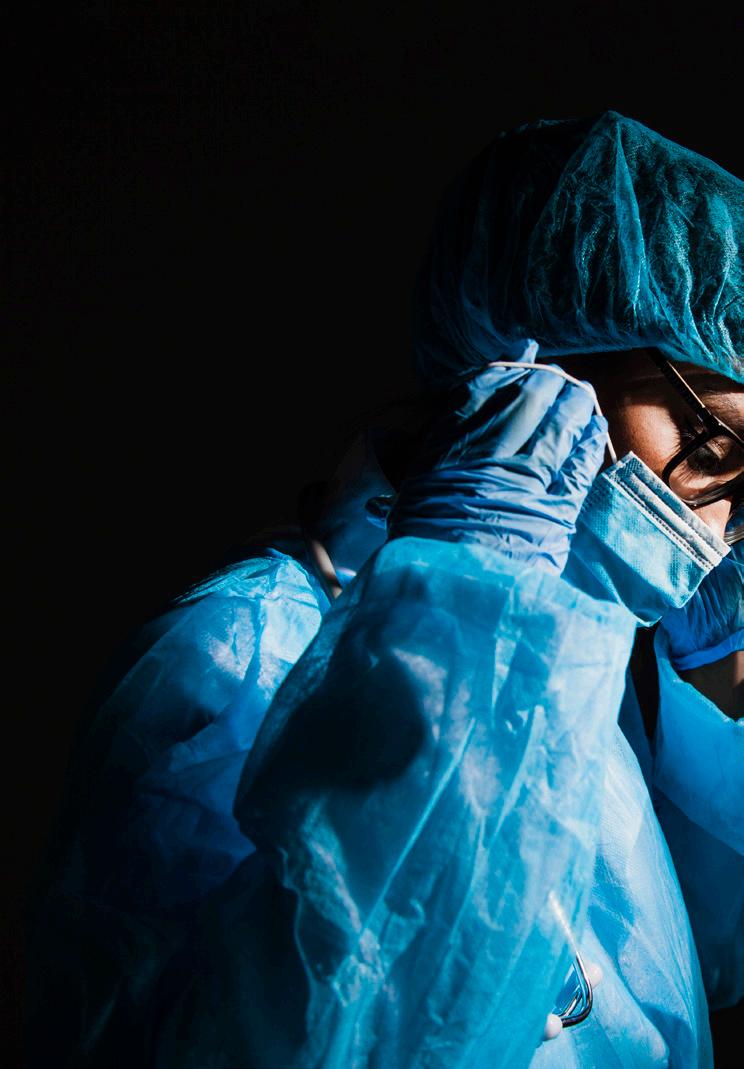
6 minute read
Medical Negligence Litigation: Who Cares for the Healthcare Professional?
by GIE LEVI S

Most healthcare professionals find their jobs to be very rewarding and fulfilling. Physicians and nurses see patients at what is probably one of the most difficult days in their entire lives. Not only do they care for the sick and dying, they comfort and reassure worried loved ones at the same time. Healthcare professionals have a level of dedication that is not easily matched. There is no greater reward than what occurs between a healthcare professional and their patient, when their combination of unique scientific knowledge, clinical skill and compassion helps lead a patient to better health and improved quality of life. I believe this is what keeps the healthcare professional coming to work even under increasingly difficult times.

Healthcare professionals today face a myriad of traumatic situations such as injuries and death due to gunshot wounds, domestic violence situations, car accidents or from struggles with terminal illnesses. The number of healthcare professionals who have been verbally and/or physically assaulted by their patients or family members has risen steadily over the past five years. And, tragically, healthcare professionals are occasionally murdered by the very patients they work to treat. As a nurse in the 1980s, I was never fearful of my patients or their family members. I never went to work thinking that I might be assaulted or worse. Is it any wonder that our healthcare professionals today are reporting job dissatisfaction and burnout at increasingly alarming rates?
Think about what these healthcare professionals see every day, then add the stress of an allegation of medical negligence which has led to litigation. As a litigation team member at The Ohio State University Wexner Medical Center, I’ve seen firsthand that being a healthcare professional today has grown to be inherently risky, it is impossible to avoid all risk and one can do everything right and still get sued. In initiating medical negligence litigation, it is the patient that determines the definition of a bad outcome, not the healthcare professional. to pursue compensation. When a medical error occurs, most healthcare professionals and hospitals truly want to do the right thing. But doing the right thing typically means litigation due to the complexities of these cases. While the patient may be injured or die due to medical error, we must keep in mind that an injury or fatal error is something that also haunts the healthcare professional the rest of their lives.
Healthcare professionals feel and express genuine sorrow for the patient and/or their family when a medical error occurs. But due to the nature of their profession, they must put the medical error in the rearview mirror as there are other patients that need them. What we must understand is that putting a medical error in the rearview mirror does not mean that the healthcare professional has resolved their feelings about the error and unfortunate outcome for the patient.

It is tragic when a medical error causes injury or death to a patient. And it is important that our legal system provides patients and/or their families with the ability
When a complaint for medical negligence is served to the healthcare professional, we need to be cognizant that a bandage is being ripped from an emotional wound. The legal professional may encounter a physician or nurse who is shocked, angry, sad or anxious upon receiving the news of litigation, yet they are expected to carry on just as the patient and/or family must do. As legal professionals, we understand that a death or injury from a medical error can turn the life of a patient and/or family upside down. But we should not lose sight of the fact that the healthcare professional may be struggling as well.
As legal professionals, we don’t always recognize that we contribute to the distress healthcare professionals may feel when they are involved in medical negligence litigation. Litigators can cause stress for the healthcare professional with something as simple as notifying them of litigation by impersonal email, or taking the “scorched earth” approach during a deposition or at
trial. Litigation is by design adversarial and very difficult on all the parties. While we try to make sure that the patient and/or patient’s family is receiving support throughout the litigation process, the same support is not always extended to the healthcare professional. So who takes care of the healthcare professionals during litigation?
In the current environment, I can honestly say that not all healthcare professionals receive emotional support immediately after a medical error occurs. Almost none receive support when litigation is filed. While legal professionals are not psychologists, there are things that we can do to support the emotional well-being of healthcare professionals involved in medical negligence litigation. If at all possible, we should never notify a healthcare professional of a medical negligence action by email. It is felt that legal professionals should start building a solid attorney-client relationship with the healthcare professional with a face-to-face notification

meeting. Delivering the complaint in person, when possible, will allow the healthcare professional to ask questions immediately, gain some understanding of the legal process and facilitate a trusted working relationship. Development of a good working relationship between the healthcare professional and the litigation team is critical to promoting absolute candidness about the circumstances that led to the litigation. I would encourage the legal professionals who are deposing or cross-examining healthcare professionals to be respectful and just ask questions to get to the facts. There truly is no need for the accusatory or hostile questioning of a healthcare professional. It is just beating up a healthcare professional who has probably already beat themselves up enough.
Medical negligence litigation can accentuate a healthcare professional’s feelings of sadness, sorrow and isolation. It is critical that legal professionals take time during the initial meeting to ask the healthcare professionals that we represent how they are doing. It is absolutely permissible to acknowledge the healthcare professional’s emotions regarding this situation. Gently ask how they have coped with difficult situations in the past as their response will give you some idea of their resilience in the current situation. Those who have struggled to cope with difficult situations in the past may very well

Legal issues often arise when you least expect them, and when they do, it is important to contact a law firm you can trust.
536 S. High Street Columbus, OH 43215 614-221-1342
tyacklaw.com PERSONAL INJURY CRIMINAL DEFENSE CIVIL LITIGATION
lack the coping skills to handle the adversity of litigation. we would all want our healthcare professionals to be well.
If you feel a healthcare professional is struggling, please don’t hesitate to offer assistance in making a connection to an Employee Assistance Program, a hospitalbased support program, or a licensed therapist or counselor. If you are legal counsel for a hospital system without the necessary support services for the healthcare professional, please don’t be shy about making a recommendation that they start a program. A hospital psychologist recently said to me during a conversation about healthcare professional well-being, “Do you want to be treated by a healthcare professional who is ill, or a healthcare professional who is well?” It is inevitable that we will all need healthcare services at some point in our lives, and I suspect
Angie S. Blevins, RP, OSBA, CPHRM
The Ohio State University










